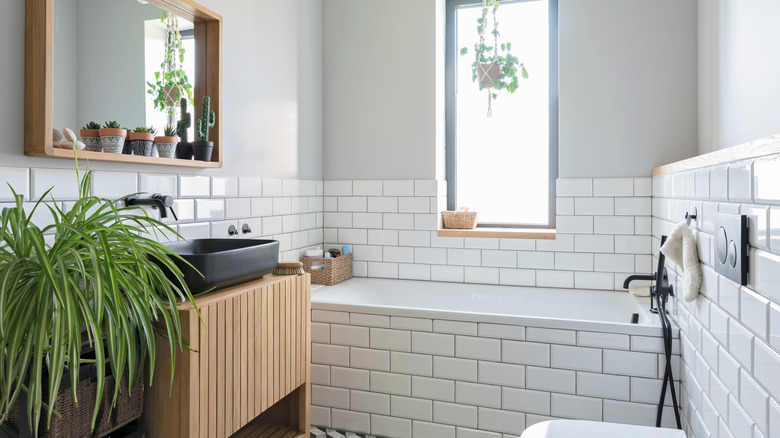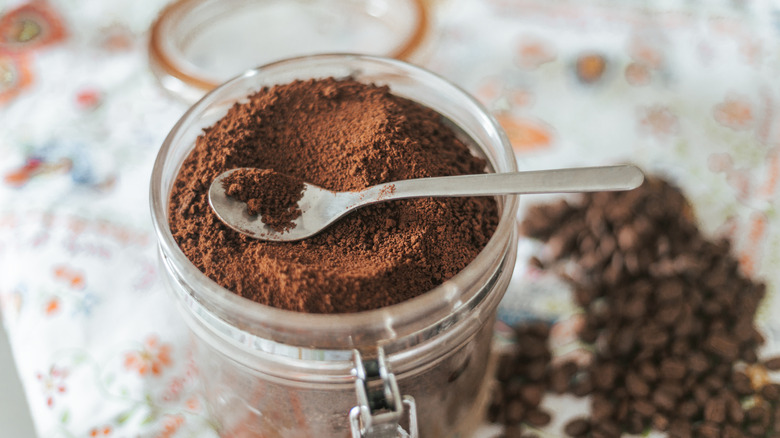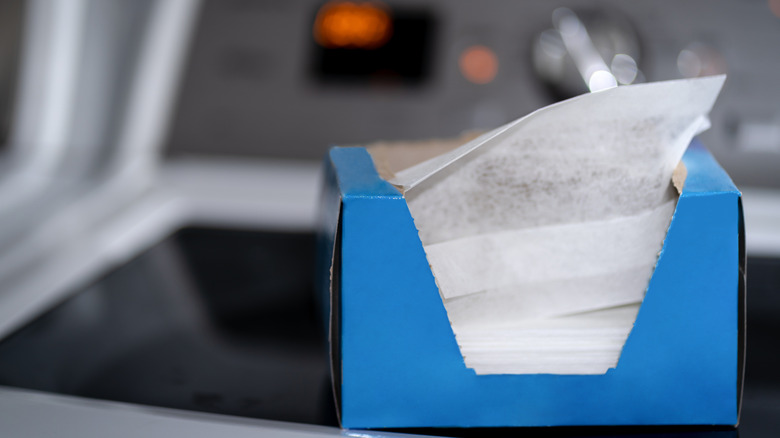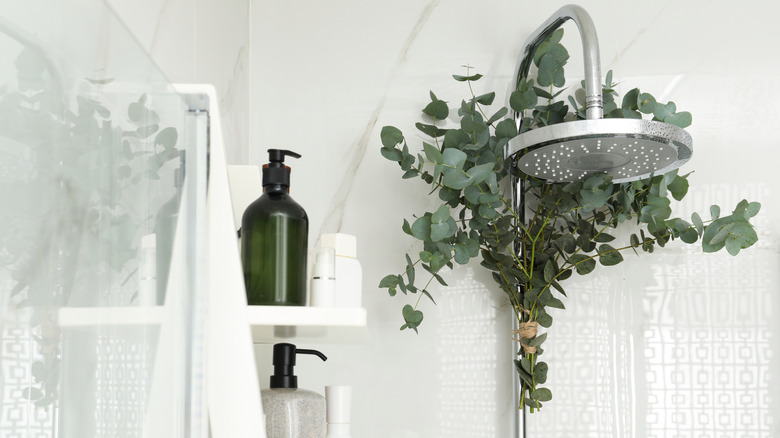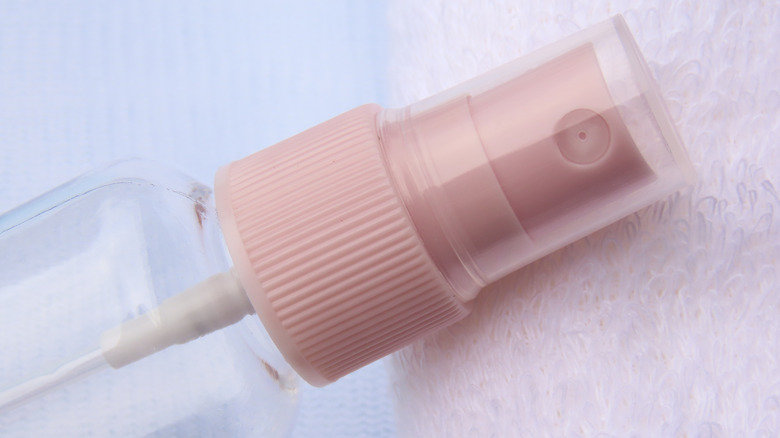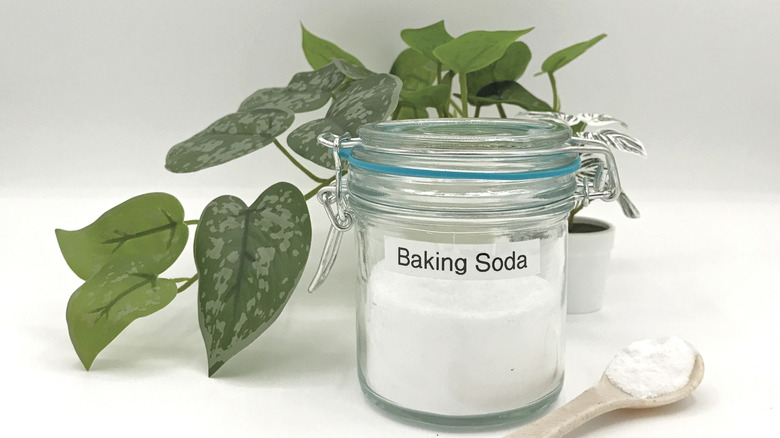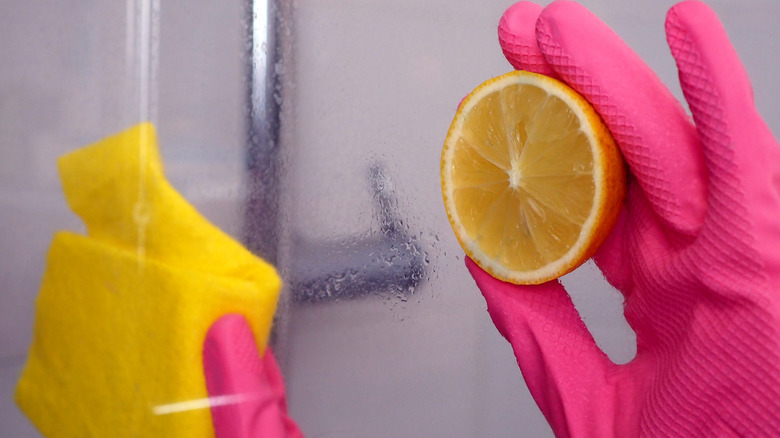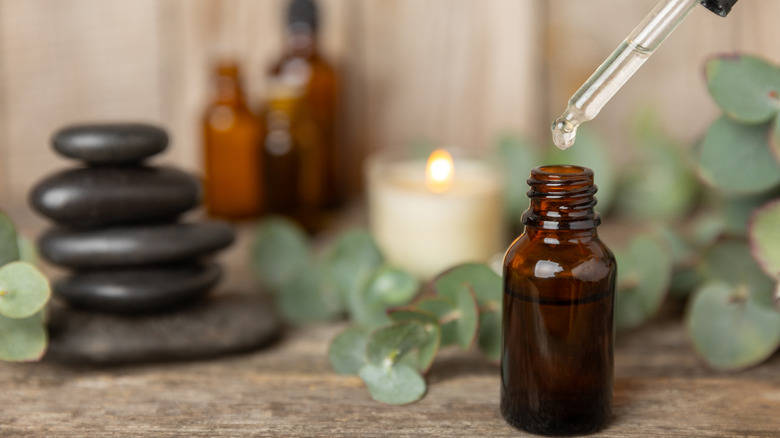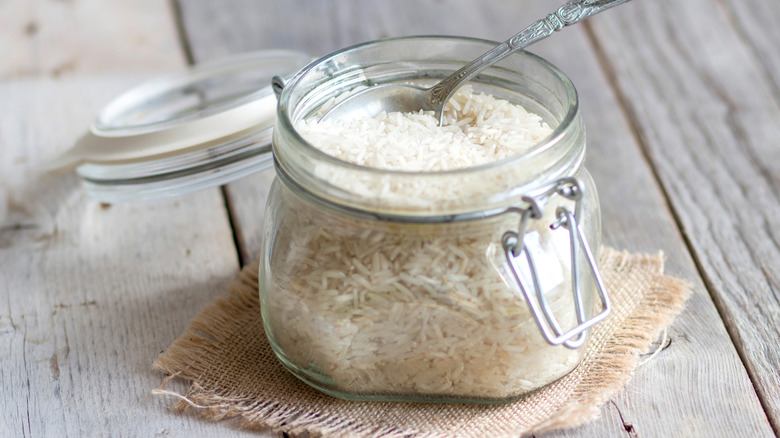8 Clever Tricks To Deodorize Your Bathroom
Some rooms in the home smell better than others. The kitchen may be known for its scent of delicious dinners or fresh-baked desserts, while the laundry room may be an area that has a consistently floral aroma. Unfortunately, however, the bathroom is the one place that isn't commonly associated with pleasant fragrances. In addition to the usual stinky culprits, the toilet and trash can, bathrooms can quickly become musky because they're often the most humid room in the house. Mold, mildew, and bacteria thrive in moist environments, and these organisms release smelly compounds into the air.
Despite all of the characteristics that make bathrooms known for not smelling the greatest, there are several ways to combat these odors. First, you need to determine where exactly the stench is coming from, and sometimes the answer isn't always the obvious locations. Then, to keep your bathroom fresh between cleanings, you'll want to use methods that absorb and neutralize odors rather than just mask them. Otherwise, you'll be stuck with a foul mixture of the fragrance and unpleasant smell. Below, we've outlined some of the sneakiest odor-harborers in the room, along with the best tricks for eliminating them.
Use coffee grounds as an odor absorber
For many, the first few moments upon waking up are spent filling the coffee maker with fresh beans. Once you've finished your latte, you may want to hold onto the leftover grounds rather than tossing them out, because coffee grounds happen to be one of the DIY remedies that'll leave your bathroom smelling fresh as can be. Scientists at the City College of New York found that used coffee grounds can be transformed into an eco-friendly material strong enough to capture hydrogen sulfide, the gas responsible for sewer odors. The secret lies in the nitrogen within caffeine, which helps to absorb and neutralize odors in the air. Pure coffee grounds mightn't' have quite the same level of odor absorption as the adsorbent material produced in the study — but they're still worth a try for fighting bathroom smells.
Luckily, you won't need to sacrifice your favorite bag of beans to reap the odor-eliminating benefits. Instead, you can reuse the leftovers that would otherwise go straight to the bin. Once you finish your cup of Joe in the morning, remove the used grounds and put them on a tray to air dry. If you want to speed up the process a bit, you can pop them in the oven on low heat to remove the excess moisture. Then, pour the dried grounds into a glass dish or add them to a small sachet. You can keep it on the counter or hang it in any areas where odors tend to linger. You'll need to replace it every so often once the sachet has done its job. If you're a routine coffee drinker, you'll have a steady supply of grounds ready to swap in.
Deodorize the trash can with a dryer sheet
One of the most incredible ways to use dryer sheets is to put them to work banishing odors in your bathroom. Aside from the toilet, the bathroom trash is a common culprit of unpleasant aromas lingering in the air, and it can be tricky to eliminate them. Dryer sheets are commonly used to prevent static, but they're also a big part of what makes clean laundry smell fresh. As they tumble with your clothes in the dryer, fragrance molecules from the softener coating are released onto fabrics, with some dissipating into the heated air. In a trash can, though, they won't lose their fragrance as quickly. Instead, they'll release a clean, fresh scent for days on end.
Line the bottom of your trash can with a couple of dryer sheets to prevent unpleasant odors from taking over your bathroom. Each time you change the trash, toss out the old sheets and wipe down the bin to remove any leftover smells. Then, add a couple of fresh sheets before placing the next bag inside. It's important to note that the chemicals in dryer sheets are often toxic to cats and dogs, so use this trick with caution if you have any pets that are known for nosing in the trash.
Hang eucalyptus in the shower
Did you know that hanging eucalyptus in your shower can help promote good feng shui? Besides this, it's also known for its soothing fragrance, which is commonly used in aromatherapy to create a calming effect. While you can find eucalyptus-scented candles or air fresheners, the plant itself can also provide a long-lasting refreshing effect. When fresh branches are hung from the showerhead, the fragrant essential oils within the leaves will release into the steam. With each shower, the oils will release a natural, spa-like scent and may help neutralize typical bathroom odors. Eucalyptus essential oil has antibacterial properties, which is one of the reasons why it can help fight odors. Of course, the foliage is a much less concentrated source of oils compared to a bottle of essential oil — but it still provides a fresh clean smell, and makes for a mild, slow-release way to infuse your space with its pleasant, and potentially odor-eliminating, scent. Plus, the long, trailing stems look pretty as they cascade around the showerhead.
If you don't have a eucalyptus tree in your yard, you can typically find stems at grocery stores, flea markets, plant shops, or online shops. You'll want at least three branches, though you can make a bouquet as big as you like. Start by removing the leaves at the bottom of each branch so you can tie them together without the foliage getting in the way. Next, wrap a long piece of string or twine tightly underneath the leaves several times, leaving a couple of inches of the stems sticking out from the bottom. Once you have your bouquet, tie it beneath the showerhead so the leaves cascade around it, making sure it's positioned just out of the direct water flow. Replace the bundle every few weeks or as needed.
Spray your bath mats with diluted vinegar
When trying to identify the stench emanating from the bathroom, your bath mats are a sneaky culprit that's easy to miss. Bath mats are made from thick, absorbent materials and are designed to hold onto water so you don't soak your floors each time you step out of the shower. Even though you're clean after bathing, chances are you've already stepped on the mat beforehand, transferring bacteria from your uncleaned feet. Then, the excess moisture sitting in the fabric can encourage the growth of odor-causing bacteria, creating that infamous musky smell. Luckily, distilled white vinegar can help combat this. There are various vinegar hacks that can make your bathroom sparkle — and vinegar can also be used to fight odors in bath mats, as it contains acetic acid, which is antibacterial.
To get rid of mildew smells in your bathroom, add distilled white vinegar to a spray bottle and spritz it over your bath mat as needed. Of course, although vinegar is considered a deodorizer, it does come with it's own pungent scent. If you find the initial whiff of vinegar to be too intense, you can dilute it with water and add a couple of drops of essential oils. Although it won't work as a replacement for regular cleaning, it can help subdue musky odors and keep your mat fresher for longer. Generally, you should wash your bath mat at least once per week, though you may need to do so more frequently if it gets a lot of use.
Keep a few open containers of baking soda on bathroom counters
Using baking soda to keep fridges smelling clean has been a household trick for decades, dating back to the 1970s. While most of us generally know about the odor-absorbing power of this common kitchen staple, one of the most unexpected ways to use baking soda is for eliminating bathroom odors. Baking soda is considered an amphoteric compound, which means it can neutralize a wide range of both acid-based and alkaline odors. So, whether it's the trash, toilet, mold, or mildew causing the unpleasant aroma, you can count on baking soda to help neutralize the smell.
Although you can clean your bathroom by making a baking soda paste (mix ¾ cup of baking soda and ¼ cup of water), baking soda can also be effective at eliminating odors when left out and exposed to air. You probably don't want to decorate the room by leaving an open box of baking soda on your counters. So, to make it look more intentional and stylish, grab a couple of jars or pretty bowls to pour it into. Make sure not to cover them; otherwise, the bicarbonate of soda won't be able to come in contact with and react to any lingering smells. The more surface area the baking soda has to interact with the air, the better. Dump out and refill the containers at least once a month or if you begin to notice lingering odors again.
Use lemons to clean soap scum
Lemons are probably another ingredient you have in your kitchen that you've never thought to bring into a bathroom, but you may want to give it a try. These sour fruits are rich in citric acid, which is what makes lemons an effective cleaner for alkaline-based soils (like soap scum and detergent build up), as well as deodorizer. The acidity can combat bacteria, which may be what's responsible for any unpleasant soap scum odors in your bathroom. Lemon juice can also help fight mildew, one of the main culprits of a smelly shower. Although lemon fragrance is common in household cleaners, using real lemons offers a more eco-friendly alternative with a fresher scent that isn't chemical-based.
Using lemons to clean is also an easy, cost-effective solution that doesn't require a ton of ingredients. In fact, all you'll need is one sliced fruit to get the job done. Use half of a lemon to scrub the tub and tile in your bathroom. The acid will assist to break down and remove the soap scum (which has an alkaline pH), leaving behind a fresh scent. Before trying this trick, make sure your tub, tile, or other surfaces aren't sensitive to acids. Natural stone, porcelain, and other materials can be prone to etching or staining from acidic substances, including lemons.
Add a few drops of essential oil into the toilet after each flush
Essential oils are commonly used in aromatherapy because of their pleasant fragrances, but their benefits go far beyond this. They're concentrated plant extracts that contain compounds that give a plant its aroma and other unique properties. Some oils, like eucalyptus and tea tree, have antimicrobial effects, meaning they can combat mold, bacteria, and other microorganisms that cause odors. Although essential oils aren't able to absorb these smells, they work extremely well to both mask and potentially neutralize them. And because essential oils are so concentrated, all it takes is a drop or two to fill the air with a strong, natural fragrance.
Keep a bottle of your favorite essential oil next to the toilet. After doing your business, add a few drops of essential oils to the toilet bowl immediately after flushing. The essential oils will instantly tackle any lingering smell, replacing it with a clean, relaxing aroma. For even more staying power, try adding a couple of drops to the inside of the toilet paper roll. Each time you unroll it, you'll trigger the oil to release the refreshing plant-based scent into the air. By combining both of the methods, you'll double up on odor control before and after using the toilet.
Make a rice jar diffuser
If you want to use essential oils to maintain a fresh-smelling bathroom all day long, diffusing them is also a foolproof method. However, some diffusers can be pricey, and you may not want to purchase another product for a room you're not spending most of your time in. Luckily, you can easily make your own with an inexpensive kitchen ingredient: rice. Don't use your favorite brand of basmati for this trick; cheap rice works just as well as the fancier stuff. The essential oils will emit a pleasant fragrance, and you can tailor the strength to your liking.
Grab a small jar or decorative dish and fill it up with rice. Mix in about five drops of your favorite essential oil for each ¼ cup of rice you're using. Set it on your counter, near your toilet, or anywhere unwanted smells tend to linger. If the scent starts to fade, you can give the jar a little shake to help release the essential oil or add a few more drops. Because the rice slowly releases the oils, the fragrance often lasts longer than many other DIY fresheners, sometimes working for a few months before you need to swap it out.
